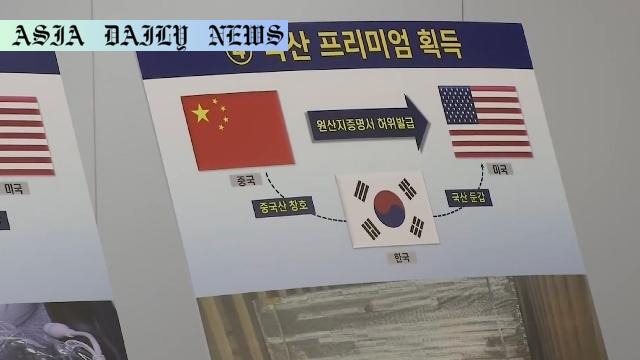Customs Crackdown: South Korean authorities investigate disguising Chinese goods as domestic exports to evade US tariffs.

South Korea’s Escalation of Customs Regulations
South Korea has intensified its efforts to prevent illegal trade operations, specifically those designed to exploit US tariff policies against Chinese products. Customs officials in South Korea announced their heightened crackdown on disguised exports on Monday, demonstrating their commitment to curbing unethical practices that misrepresent Chinese goods as South Korean. The move directly addresses exploitative tactics that aim to bypass steep tariffs, with the authorities focusing on products such as mattresses and industrial materials.
These regulations are part of a broader effort to maintain South Korea’s integrity in global trade while preventing foreign organizations from exploiting the nation as a conduit for tariff evasion. A case highlighted by customs authorities involved mattresses manufactured in China but labeled as South Korean before being exported to the United States. Similarly, South Korean agencies reported catching companies falsely rebranding China-produced battery materials.
The Global Trade Implications of Such Practices
The sophistication of mislabeling schemes is creating ripples in the international business community. The cases detailed by South Korean customs involving the fraudulent labeling of Chinese products stress the importance of transparency in the global trade environment. Such practices not only harm South Korea’s trade reputation but may also undermine trust in international export standards.
Officials disclosed that falsely labeled products intended for US markets were apparent attempts to avoid the 145 percent tariff levied by the United States on Chinese imports. Industry experts speculate that such tariffs, aimed at narrowing the trade deficit and encouraging fair trade practices, have prompted opportunistic actors to find loopholes. South Korea’s efforts to actively probe and penalize violations send a strong message internationally about its commitment to ethical trade standards.
The Role of Legal Enforcement and Media Reporting
Media coverage of the ongoing government crackdown amplifies the awareness of illegal trade practices both domestically and abroad. Reports have stated that South Korean customs officials discovered multiple cases where foreign goods were misrepresented as domestic. The South Korean public and international observers have scrutinized these revelations, urging stricter inspection of export practices while emphasizing the necessity of restoring consumer confidence in officially labeled exports.
Acting as deterrents, these investigations also promote transparency in exporting goods worldwide, thereby fostering ethical production and trade practices. By rooting out false labeling and penalizing perpetrators, South Korea ensures a level playing field for global partners while conveying its opposition to unethical behavior stemming from geopolitical trade rivalries.
Future Projections and the Importance of Vigilance
With the enforcement of stricter policies and heightened vigilance, the cases involving disguised exports reveal an unyielding vigilance in South Korea’s trade practices. The ongoing efforts suggest that governments worldwide must remain alert to potential trade loopholes and collaborate actively to maintain trade ethics and security. South Korea’s operations are a call to action for other nations to review their customs processes and safeguard their economies from similar exploitation.
Commentary
A Call for Ethical Trade Practices Amidst Changing Policies
The issue of disguised exports emerges as a compelling revelation into the gray areas of international trade. By exposing cases involving mislabeled Chinese goods, South Korea has drawn attention to the critical role of ethical practices in maintaining global partnerships. The importance of vigilance across nations cannot be overstated as countries like South Korea take bold steps to prevent unscrupulous exploiters from damaging both their economy and reputation.
The Broader Implications for Global Trade
The consequences of such mislabeling practices ripple far beyond the countries involved. By attempting to bypass tariff restrictions, unethical businesses not only threaten international trade agreements but also the economies of nations relying heavily on rules-based commerce. The US tariffs on Chinese goods demonstrate the geopolitical complexities underlying trade wars. In this intricate system, cooperation among nations is indispensable to ensure fairness.
Strengthening Frameworks for International Collaboration
This issue highlights the demand for collaborative policies among global trade participants. South Korea’s proactive stance serves as a wake-up call for other nations to double-check their own processes. Stricter enforcement mechanisms and advanced supply chain monitoring using technology can bridge the accountability gap, ensuring malpractices like falsified labeling do not slip through regulatory oversight.
An Opportunity for Positive Advocacy
Situations like these also offer an opportunity for leaders, organizations, and governments to promote conscientious consumer awareness. When buyers understand the significance of ethical trade and tariffs, the demand for transparency can further incentivize industries to comply with international standards, reducing malpractice. South Korea’s actions should also inspire broader discussions on improving penalties for such misdeeds to dissuade future occurrences effectively.


